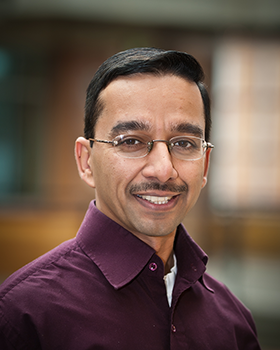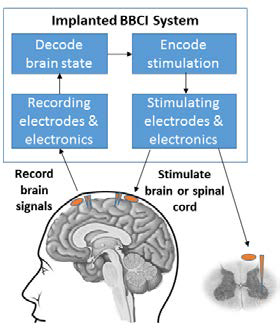 The Center for Sensorimotor Neural Engineering, led by UW CSE professor Raj Rao, will receive $16 million over the next four years from the National Science Foundation to support the development of implantable devices that will enable patients who have suffered stroke or spinal cord injury to move again. The new funding will enable CSNE to continue its groundbreaking work on bi-directional brain-computer interfaces that interpret and wirelessly transmit brain signals across damaged regions of the nervous system.
The Center for Sensorimotor Neural Engineering, led by UW CSE professor Raj Rao, will receive $16 million over the next four years from the National Science Foundation to support the development of implantable devices that will enable patients who have suffered stroke or spinal cord injury to move again. The new funding will enable CSNE to continue its groundbreaking work on bi-directional brain-computer interfaces that interpret and wirelessly transmit brain signals across damaged regions of the nervous system.
From the UW News release:
“‘There’s a huge unmet need, especially with an aging population of baby boomers, for developing the next generation of medical devices for helping people with progressive or traumatic neurological conditions such as stroke and spinal cord injury,’ said CSNE director and UW professor of computer science and engineering Rajesh Rao….
“‘When Christopher Reeve sustained a spinal cord injury due to a fall from his horse, his brain circuits were still intact and able to form the intention to move, but unfortunately the injury prevented that intention from being conveyed to the spinal cord,’ Rao said.
“‘Our implantable devices aim to bridge such lost connections by decoding brain signals and stimulating the appropriate part of the spinal cord to enable the person to move again.'”
 CSNE researchers aim to not only restore movement with the new devices, but also to promote brain plasticity and enable rehabilitation of the affected areas. Rao and his colleagues intend to conduct proof-of-concept demonstrations in humans within the next five years. They are also working to improve existing implantable technologies—for example, deep brain simulators used to treat people with Parkinson’s disease—to reduce negative side effects and cut down on the number of replacement surgeries required for patients living with such devices.
CSNE researchers aim to not only restore movement with the new devices, but also to promote brain plasticity and enable rehabilitation of the affected areas. Rao and his colleagues intend to conduct proof-of-concept demonstrations in humans within the next five years. They are also working to improve existing implantable technologies—for example, deep brain simulators used to treat people with Parkinson’s disease—to reduce negative side effects and cut down on the number of replacement surgeries required for patients living with such devices.
CSNE was first established with an initial grant from NSF in 2011. The center engages faculty and students in computer science, engineering, neuroscience and other disciplines from the UW, MIT, San Diego State University, the University of British Columbia and several other academic and industry partners.
Read the full UW media release here and a great article in the Seattle Times here. Learn more about CSNE by visiting its website here.
Congratulations to Raj and the entire CSNE team!

